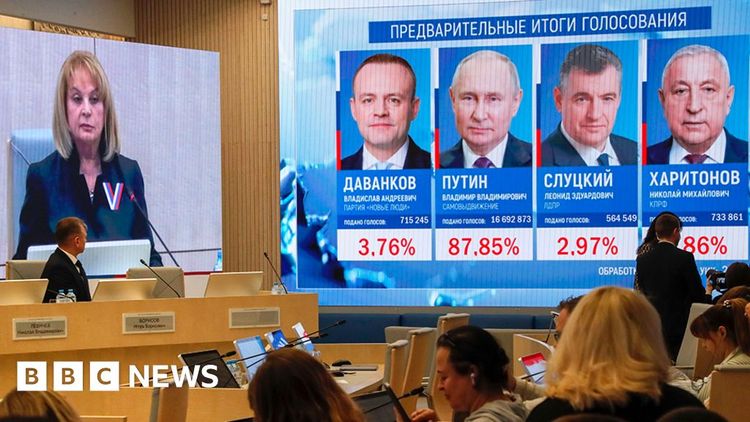Putin's fifth term as Russian president was predictable, but what comes next?

Viewers witnessed fans applauding Putin as he expressed gratitude to the Russian people for entrusting him.
When it comes to forecasts, it was a simple matter to predict that Putin would win by a wide margin.
You don't need a magical tool to predict that.
In Russia, the political system, which includes elections, is under strict control by the Kremlin.
However, the question remains as to how Vladimir Putin will utilize his 87% majority? What can be expected from his fifth term in office?
The fifth iteration of Vladimir Putin's reign may not deviate significantly from the fourth.
Don't anticipate a magical moment where the hawk transforms into a dove with a wave of a wand.
It is likely that President Putin will persist with his present course of aggressive actions in foreign lands and repressive measures within his homeland.
Moving forward, it is likely that the conflict in Ukraine will persist, and there will be ongoing tension with Western countries. Additionally, Putin will likely pursue his agenda of making Russia more focused on military strength, which could involve a propaganda campaign within the country.
Regarding the civil society in Russia, it is facing a lot of pressure and it is highly possible that this will increase even more.
The statistic of 87% is a tremendously high number.
Certainly, this will not persuade Western politicians that it accurately represents Putin's present degree of popularity.
The presidential vote in Russia was criticized by David Cameron, the British Foreign Secretary, stating that it was not a true representation of free and just elections.
However, within their own country, it enables the Kremlin to assert that the entire population has joined together in support of Vladimir Putin and that the Russian leader has complete backing from his citizens.
Important to note is that he's able to assert that the majority supports his actions in Ukraine and approves of the way he's leading Russia.
Vladimir Putin has declared he won the election by a large margin, but he didn't have any viable contenders.
The percentage of 87% is a strong indication to the political leaders in Russia that they should be aware that only one person has the authority and power to dominate and manage the situation, and it's unlikely to change in the foreseeable future.
It holds great significance for Vladimir Putin as it has almost been a year since the short-lived yet eventful rebellion by the Wagner mercenary faction. This revolt, headed by Yevgeny Prigozhin, had boldly contested Putin's domination.
Ultimately, the leader of the Kremlin emerged victorious. Following the rebellion, Prigozhin passed away after being involved in an aircraft accident two months later.
There's an additional piece of information worth mentioning about the 87% statistic - it's an excellent morale boost. Imagine being a president and hearing that you've achieved another massive victory. It could make you feel even more commanding, unstoppable even.
During his press conference on Sunday evening following his election victory, Putin displayed a notable amount of self-assurance.
The blog post talks about how the leader has a very strong sense of self-assuredness as they have already held their position for twenty-five years and are expected to surpass Catherine the Great as the longest-serving leader in Russia.
The self-assurance of a person in charge who has established a governmental framework that enabled him to secure 87% of the ballots and re-elected him for a fifth term in office.
He displayed great confidence while speaking about the ongoing war between Russia and Ukraine, asserting that his country holds the upper hand. He also strongly criticized Western democratic systems, while further predicting that Russia will emerge even stronger after the election.
Critics argue that a leader's political assurance, particularly when it becomes excessive, can pose a threat.
Particularly when there are no safeguards and counterbalances in place within a nation's governmental structure.
Today's Russia doesn't have many of them.



























































